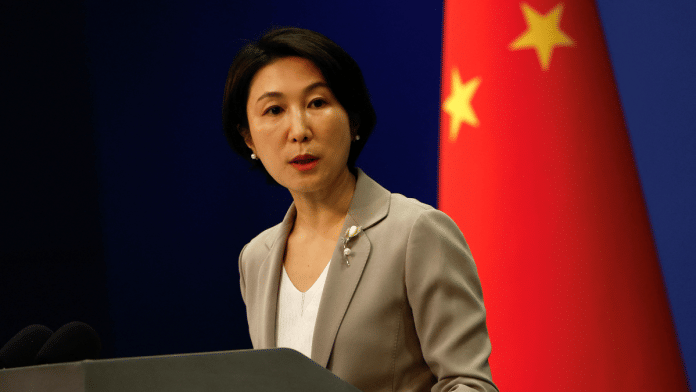New Delhi: China is willing to play a “constructive role” in India and Pakistan “properly settling” their differences, Chinese Foreign Ministry spokesperson Mao Ning said Monday, while stressing Beijing’s defence and security cooperation with Islamabad are not aimed at any third country.
Responding to a question on Deputy Chief of Army Staff Lieutenant General Rahul R. Singh’s comments last week that India not only faced Pakistan but also China during Operation Sindoor, Mao defended Beijing’s “traditional friendship” with Islamabad, saying that defence and security cooperation is part of the “normal cooperation” between them.
“India and Pakistan are neighbours that cannot be moved away, and they are also important neighbours of China. For a period of time, China has closely followed the development of the situation in India and Pakistan, actively persuaded and promoted peace talks, and maintained regional peace and stability,” Mao said.
The Chinese foreign ministry spokesperson added, “We welcome and support India and Pakistan to properly handle differences through dialogue and consultation and seek fundamental solutions. China is also willing to continue to play a constructive role in this regard. China-India relations are at a critical stage of improvement and development. We are willing to work with India to promote China-India relations to continue to develop along a healthy and stable track.”
Last week Lt. Gen. Singh pointed out that while Pakistan was the “front face” during Operation Sindoor, it received “all possible support” from China. Beijing would rather use “the neighbour” to cause pain to India, rather than get involved by itself on India’s Northern borders, added Lt.Gen. Singh.
When asked about this, Mao said, “I don’t know the specific situation you mentioned. What I want to tell you is that China and Pakistan are traditionally friendly neighbours. Defence and security cooperation is part of the normal cooperation between the two countries, not for third parties.”
“What I can say is, China-Pakistan relations do not target any third party. This is China’s policy. On India-Pakistan relations, we support the two sides in properly addressing differences through dialogue and consultation and jointly keeping the region peaceful and stable.”
The Chinese foreign ministry spokesperson pointed out that ties between India and China “are at a crucial stage of improvement and development”, with Beijing ready to work with New Delhi to move ties forward.
Ties between the two countries had hit a rough patch, particularly after the Galwan clashes in the summer of 2020. Last October, India announced that the two sides had reached an understanding to disengage at the friction points across the Line of Actual Control (LAC), which set the stage for a bilateral meeting between Prime Minister Narendra Modi and Chinese President Xi Jinping on the margins of the BRICS summit in the Russian city of Kazan on 23 October, 2024.
Since then the two countries have been taking measures to build confidence, including the resumption of the Kailash Mansarovar Yatra this summer by Beijing, while New Delhi is working out the technical details for direct air connectivity to restart.
China Sunday condemned the terrorist attack in Jammu and Kashmir’s Pahalgam that left 26 people dead. The condemnation was a part of the BRICS leaders’ Statement, which was announced after consensus by the group’s members was arrived at.
However, when Operation Sindoor was launched by India 7 May, Beijing had called the military strikes on terrorist complexes within Pakistan as “regrettable”.
Beijing lodges protest over Dalai Lama
The Chinese foreign ministry spokesperson also said that Beijing has lodged a protest over Prime Minister Narendra Modi’s birthday wishes to the Dalai Lama, who turned 90 Sunday. The spiritual leader fled Tibet in 1959 and has since lived in Dharamshala in Himachal Pradesh.
“The position of the Chinese government on Xizang-related (Tibet) issues is consistent and clear. As is widely known, the 14th Dalai Lama is (in) a political exile who has long engaged in anti-China separatist activities and seeks to separate Xizang from China under the cloak of religion,” Mao said.
The foreign ministry spokesperson added, “India needs to be fully cognizant of the sensitivity of issues related to Xizang, see clearly the anti-China and separatist nature of the 14th Dalai Lama, honour the commitments India has made to China on issues related to Xizang, act prudently, and stop using those issues to interfere in China’s internal affairs. China has protested to India regarding its actions.”
(Edited by Ajeet Tiwari)
Also Read: India-China agree to ‘stabilise and rebuild ties’, to start talking economy and trade next






